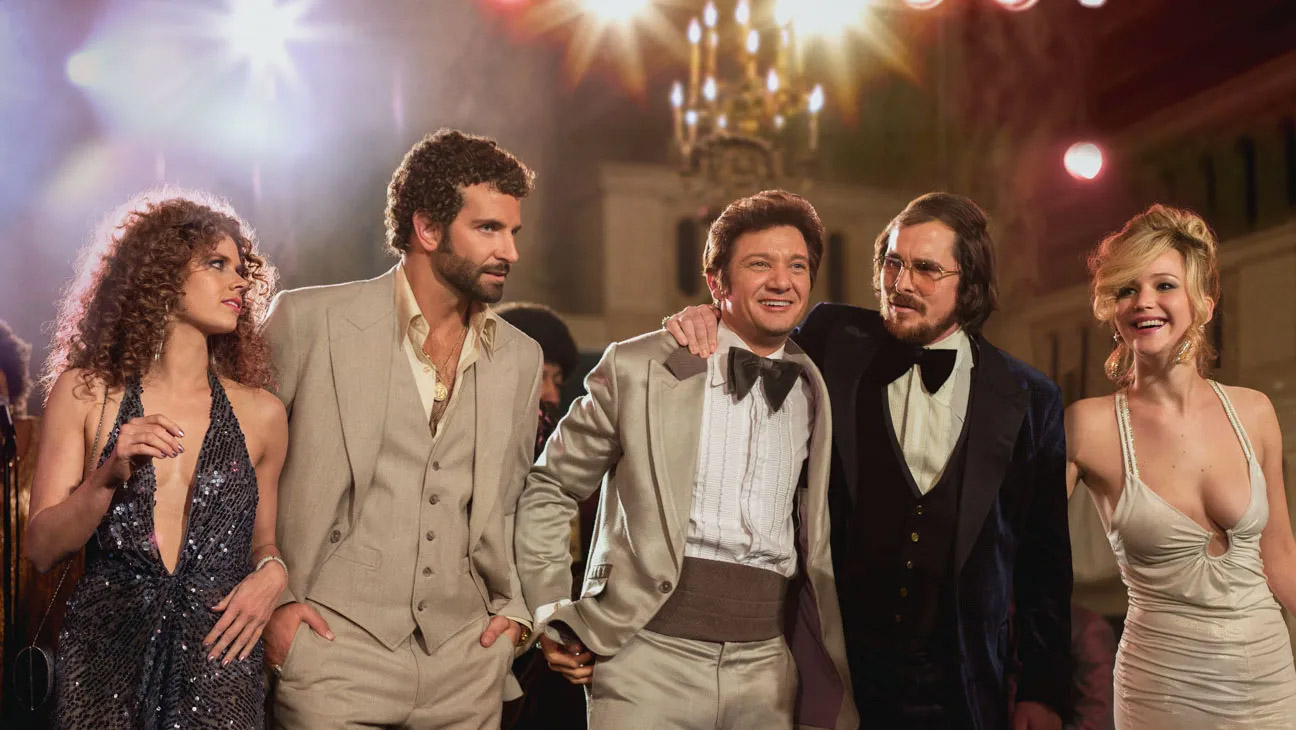A whirlwind tour of duplicity, decadence, and defiance, David O. Russell’s dramatic comedy film “American Hustle” (2013) harks back to the hysteria and headiness of the 70’s, where psychedelia, politics, and paranoia mingled freely. Starring Bradley Cooper, Jennifer Lawrence, Christian Bale, Amy Adams, and Jeremy Renner, this star-studded film ensnares viewers in a web of intrigue, deception, and allure that represents the tangle of the era it so impressively recreates.
At the heart of the film is the ABSCAM operation, a notorious late 20th Century FBI sting designed to catch corrupt politicians in compromising situations. What sets “American Hustle” apart, though, is its spotlight not just upon the calculating enforcers of the law but the fumbling, fallible, and oh-so-human lawbreakers they were chasing.
Christian Bale and Amy Adams deliver stunning performances as Irving Rosenfeld and Sydney Prosser, two con artists ensnared by Cooper’s ambitious FBI agent Richie DiMaso. Bale, with a gut and a comb-over that are as seminal to his character as his incredible acting prowess, captures the essence of a man constantly teetering on the edge. Amy Adams, skillfully juggling an excruciatingly complex character, is adeptly convincing as an improbable combination of innocence and guile.
Jennifer Lawrence, as Irving’s manic but oddly endearing wife Rosalyn, establishes herself as a standout performer, drawing laughs and gasps in equal measure. Rosalyn is a cataclysm waiting to happen – enthralling, onerous, and wholly unforgettable, much like the era the film portrays.
Indeed, what truly defines “American Hustle” is its effective recreation of the tumultuous decade. Flush with vibrant costumes, tacky décor, impeccable hairstyles, memorable music, and quick-witted, punchy dialogues, the film thrives in its unabashed embrace of the 70’s. Each actor looks like they stepped straight out of a vintage magazine, so perfectly do they embody the zeitgeist of that era.
Yet, “American Hustle” refuses to claim the era as a mere backdrop: instead, it threads 70’s culture and politics masterfully through the narrative, making it not just a setting but a potent character in its own right, influencing and participating in the course of action.
At its core, “American Hustle” is a character study that probes the nebulous morality and the raw humanity of its players. As the tension rises, it’s not just about how the con will play out, but how the characters negotiate the difficult minefield of trust, betrayal, love, and ambition. It’s a testament to the screenplay by Eric Singer and David O. Russell itself that every character exudes complexity and depth, making their choices and failures impactful and real.
Visually, “American Hustle” is a treat. Cinematographer Linus Sandgren beautifully captures the contrasting grit and gloss of the 70’s, while production designer Judy Becker and costume designer Michael Wilkinson recreate the era in all its tacky, flamboyant glory.
While the pacing might be slow for some, the film never lacks in humor, emotion, or nostalgia. It is an entirely immersive experience, accentuated by the superb performances and sharp direction.
In conclusion, “American Hustle” is a rollicking, hedonistic ride that thrusts you straight into the heart and heat of the 70’s. It’s a testament to David O. Russell’s prowess as a filmmaker, grounding a familiar caper narrative in the complexities and excesses of humanity, resulting in a thoroughly engaging and memorable cinematic experience.
More than being a mere period drama, “American Hustle” is an exploration of the innate unpredictability of human behavior and the allure of ambition and deception. While the con may be the driving factor of the narrative, the characters, with their myriad flaws and strengths, are undeniably the soul of the film. And it is their riveting journey through the ups and downs, twists and turns of the plot that makes “American Hustle” one of the most compelling films in recent times.




